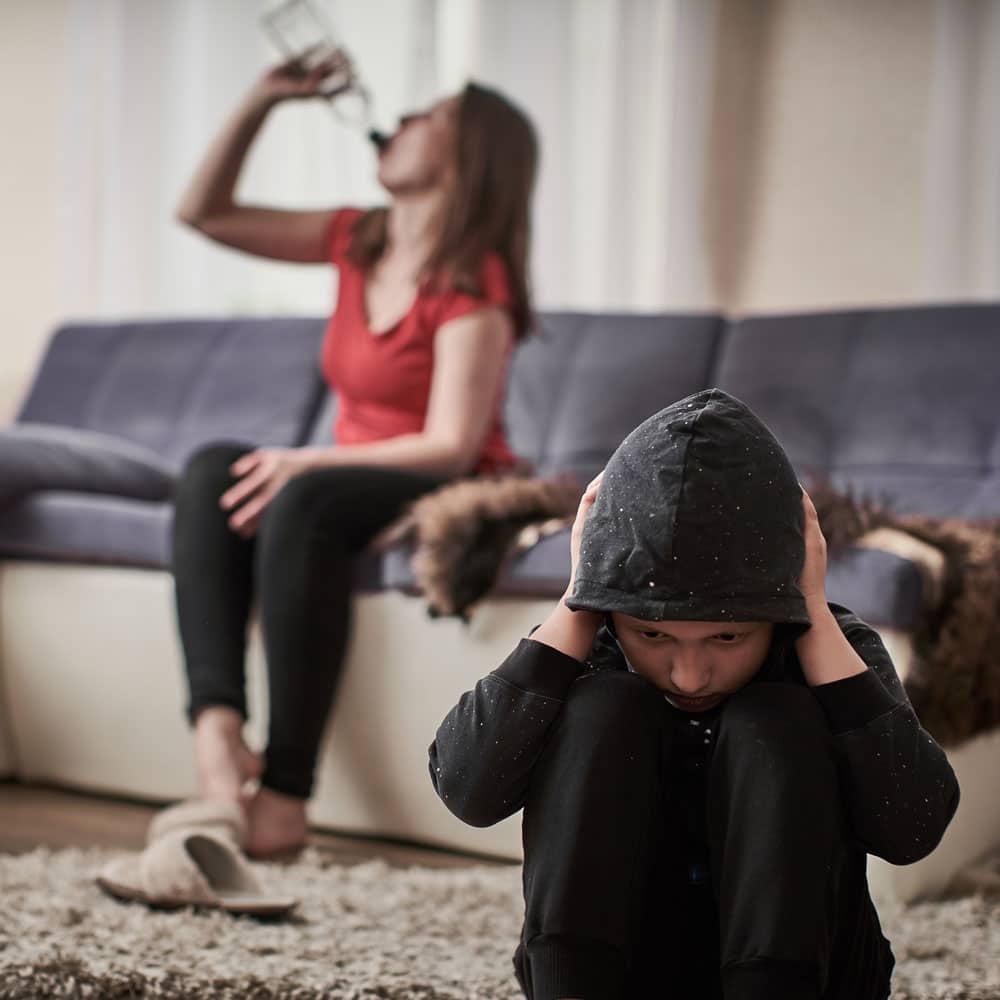By Bobby Shriver
In addition to the basics of food and shelter, children also need stability, consistency, and emotional care in order to thrive. Typically, at a young age, children form an emotional attachment with their caregivers, and this has an influence on their development. The most important emotional attachment for a child is usually their parents. Children learn from their parents how to behave, how to function in life, and how to form other healthy relationships. When children grow up in unstable environments, it can disrupt normal development and lead to difficulties, such as mental health conditions.
The most important emotional attachment for a child is usually their parents. Children learn from their parents how to behave, how to function in life, and how to form other healthy relationships.
The Effects of Growing Up with Alcoholic Parents
One environment that can be challenging for children is a home in which one or both caregivers struggle with alcoholism. The characteristics of alcoholism can interfere with a person’s typical parenting abilities. They may have an unusual schedule that leads to instability in the child’s life, and they may not be able to provide consistent care. They may act in unusual or harmful ways towards the child, including making hurtful statements or becoming violent while under the influence. Further, the parents may not be emotionally available, and therefore, the child is not able to have their emotional needs met.
Alcoholism’s Impact on Children’s Mental Health
As a result of the unstable environment caused by alcoholic parents, children’s mental health and development may suffer. Children of alcoholics may blame themselves for their unmet basic needs, feeling a sense of shame for their uncertain situation.

Yet at the same time, they may never have a clear understanding of good or bad role models, according to VeryWellMind.com, feeling confused or self-conscious when they realize that drinking isn’t a normal family experience. Their circumstances may also lead to rule-breaking, impulsivity, and aggressive behavior in social settings. And sadly, effects of alcoholism on children can even include emotional trauma, PTSD, and other difficult mental health conditions.
Traumatic Effects on Children
Each child is unique and consequently may respond to such conditions in different ways. One outcome that some will develop is post-traumatic stress disorder (more commonly known as PTSD). Many of us associate PTSD with veterans or sexual assault survivors, but in fact, PTSD can grow out of any situation where a person experiences a shocking, scary, or dangerous event. Unfortunately, for children growing up with alcoholic parents, where the caregiving is unstable or even abusive, this situation can represent a complex (or ongoing) trauma experience. When children develop PTSD, it often appears different than it does in adults.
Certain reminders of the trauma experience may serve as triggers that launch the person with PTSD into a cascade of difficult memories and psychological effects.
PTSD Symptoms in Children
Many factors combine to affect the exact symptoms an individual with PTSD will exhibit. Specific factors can include the child’s intellectual development, the presence of other caregivers, and the amount of time spent in the traumatic environment. When adults experience PTSD, they often have symptoms of flashbacks and nightmares. Certain reminders of the trauma experience may serve as triggers that launch the person with PTSD into a cascade of difficult memories and psychological effects. However, the developmental level and dependence of children on caregivers can result in other symptoms.
When children experience trauma, they may feel helpless or they may take on responsibilities in the home, while still being unable to resolve the larger situation. They may withdraw or shut down. They may disconnect or dissociate from their surroundings. They may learn to exercise avoidance just to keep going. Other times, children want to seek out help and act out with tantrums or other behavioral problems. These may be methods they developed to help them survive the difficulty of home life. Unfortunately, any of these behaviors can negatively affect children at school and in other settings.
Comorbid Mental Health Conditions
If left untreated, children of alcoholics (especially those who also experience PTSD) may develop other problems too. Many will struggle with symptoms of depression or anxiety. In fact, a study conducted by the Centers for Disease Control and Prevention (CDC) indicated that children of alcoholics have a higher risk of major depressive disorder and persistent depressive disorder well into adulthood. A separate study by the Industrial Psychiatry Journal found that children of alcoholics had significantly higher anxiety than kids without alcoholic parents. These same children have a greater chance of developing general anxiety disorder, agoraphobia, and social phobia as they’re exposed to anxiety-provoking situations at an early age, such as unpredictable home environments, neglect, hospitalization, and economic reversal.
Children of alcoholics have a higher risk of major depressive disorder and persistent depressive disorder well into adulthood.”
Other psychological effects of alcoholic parents on children can include difficulties forming attachments and trusting other individuals in their lives. Consequently, they may fear authority figures or people in general and become isolated. Some may even lose the ability to care about anything. Others may develop more difficult disorders such as reactive attachment disorder or borderline personality disorder. These types of mental health conditions can make it challenging for individuals to form healthy relationships.
Adult Children of Alcoholics
For some individuals who grow up in homes with alcoholic parents, their childhood is all about survival. They are just trying to get through each day, often taking care of themselves, younger siblings, the home, and even their parents. This survival mode may lead them to just keep functioning (at least on the surface). These children may not notice significant mental health problems until they are able to get themselves into a different situation (sometimes by entering college or moving out on their own). These adult children of alcoholics may then seek help to deal with their unresolved trauma.
Risk of Substance Abuse
Children who grow up in homes with alcoholic parents and experience trauma and develop PTSD often go on to have their own issues with substance use disorders. The reasons for this increased risk of substance abuse are threefold. First, these children may have a genetic predisposition towards substance use. Second, by witnessing substance use, it was role modeled for them. Third, sadly, in their efforts to cope with their PTSD, they often turn to substances as a maladaptive means of coping. They may find that it helps them “numb out” or temporarily reduce their symptoms and set aside their traumatic memories.
Relationship Patterns and Trust Issues

When lying, secrets, denial, and broken promises are normal experiences for a child growing up with alcoholic parents, it’s likely they can develop trust issues that carry on into adulthood. If there was parental violence or abuse associated with drunken behavior as well, adult children of alcoholics may have a heightened desire to avoid conflict or confrontation, even fearing anyone who shows anger.
These trust issues can also impact an adult child’s personal relationships. They may have difficulty getting close with anyone, let alone being in a romantic relationship. At the same time, the adult child may stay in a toxic relationship out of fear of abandonment if their alcoholic parent was emotionally or physically unavailable, VeryWellMind.com shares.
Low Self-Esteem
Adult children of alcoholics may also struggle with low self-esteem. Because children often derive their own self-perceptions from their parents, children with alcoholic parents may never have received the accurate affirmation they needed, leading to insecurities related to their self-image for the rest of their lives.
Yet this lack of self-esteem may also come from perfectionist tendencies developed as children attempted to receive positive attention (or even avoid negative attention) from their alcoholic parents. Consequently, these perfectionist children may develop unrealistic expectations of themselves, causing them to feel inadequate, worthless, or ashamed when they can’t personally achieve them.
Difficulty with Emotional Regulation
According to research from the Journal of Child and Family Studies, growing up with alcoholic parents can lead to children having difficulty developing the ability to emotionally regulate themselves. This is likely due to the alcoholic parents’ inability to provide support and guidance in showing their children how to emotionally regulate.
When these children become adults, they may still have a hard time processing or sharing their emotions and understanding the reasons behind their feelings. They may also struggle to control their responses or reactions, as well as demonstrate more impulsive behavior that can be regretful or self-sabotaging.
Applying What We Know
Practically speaking, we want to use this information, and here are some ways:
- For parents struggling with their own alcohol problems, this may be your call-to-action to get help and improve not just your life, but also the lives of your children.
- For adults who may see children in difficult situations, speak up and link them to help. Specially trained mental health providers can provide support for children of alcoholic parents to help them cope with trauma experiences and build their resilience for their lives ahead.
- For adults who grew up in homes with alcoholic parents and complex trauma situations, seek help. Some mental health providers have specialized training in helping children of alcoholics overcome trauma.
These providers will be best able to help you alleviate symptoms of PTSD and go on to a better life.
How The Meadows Can Help
The good news is there is hope for individuals who grew up around alcoholism. Research has identified ways that therapy can help. Having a collaborative therapeutic relationship with a skilled therapist will provide a space where you can learn new skills for coping, process through your history of trauma, and move forward into your own healthier life. Specific therapy approaches can be used to best match your personal situation and unique characteristics. You can explore these options with a therapist.
For nearly 50 years, The Meadows trauma treatment program has been helping trauma victims heal and learn the skills necessary to cope with the devastating, and often hidden effects of trauma. It was specifically designed for trauma survivors by Pia Mellody and a team of world renowned experts including Dr. Peter Levine, John Bradshaw, Dr. Shelley Uram, Dr. Jerry Boriskin, Dr. Bessel van der Kolk, and Dr. Claudia Black.
Getting Help For Alcohol Addiction
At The Meadows, we treat all phases of alcohol addiction. From detoxification to our primary treatment program, we build foundations for long-term abstinence and sobriety. We focus on making changes in the way you live, face problems, and relate to others.
Recovery from alcohol addiction may not seem possible, but it is. Once you admit to having a problem, you have started down the path of recovery. Many patients trust The Meadows’ alcohol treatment program to help them begin their journey toward sobriety.



